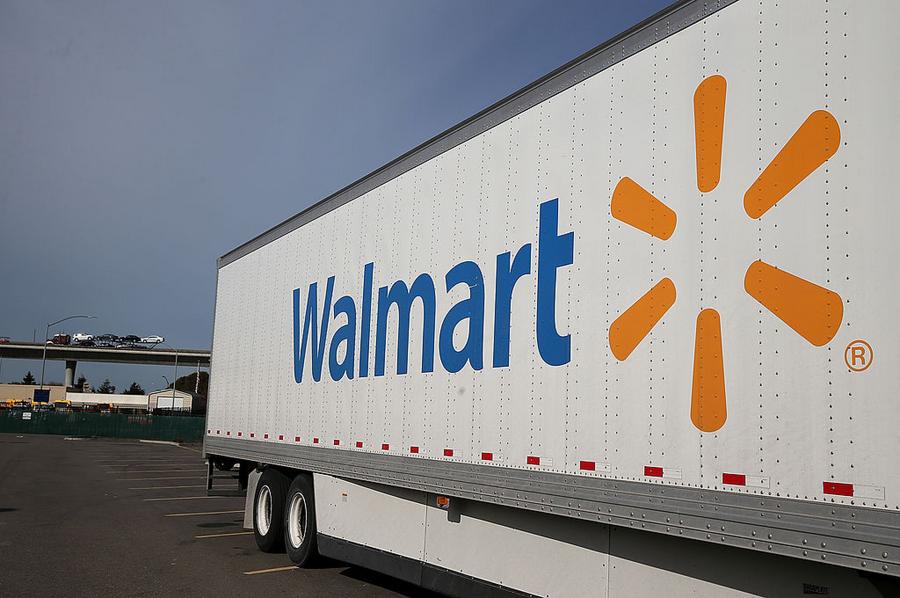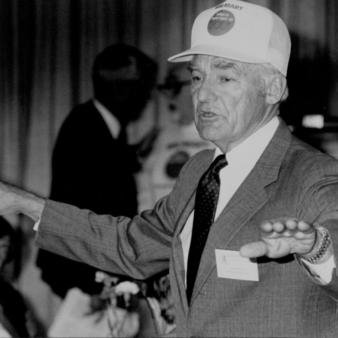When you adjust for inflation, Sam Walton is the 24th richest human being who ever lived. If you shop, chances are you've heard of Wal-Mart. Wal-Mart stores are their own microcosms. You can find just about anything and anyone in a Wal-Mart, and that has been a key to the store's success since Sam Walton first launched the chain back in 1962. It is now one of the most powerful retail entities on the planet, and the members of the Walton family are now some of the richest people in the world. Prior to his death, Sam Walton was worth $65 billion. So how did one "Mom and Pop" shop turn into a multi-national conglomerate? All it took was one person with a long range plan and a bright idea that utterly changed the retail model.
Sam Walton was born on March 29, 1918, in Kingfisher, Oklahoma. Born to a family of farmers, the Walton family found themselves struggling financially. Unable to make ends meet by farming, Thomas Walton, Sam's father, began working in the farm mortgaging industry. The family moved many times during the Great Depression, and Sam Walton worked several odd jobs to provide extra income. He sold milk from the family cow, delivered newspapers, and peddled magazine subscriptions–among other jobs. After graduating from David H. Hickman High School in Columbia, Missouri, he went on to attend the University of Missouri on an ROTC scholarship. He worked throughout his college years, while also distinguishing himself on campus, winning numerous academic, military, and school government honors.

Justin Sullivan/Getty Images
He began his retail career after graduating. His first job out of college was as a management trainee at a J.C. Penney store in Des Moines, Iowa. At the time, J.C. Penney was a fairly new company and quite small. It was the perfect place for Walton to cut his teeth on retail management. World War II pulled him away from the retail world in 1942. After serving as the captain of an Army military intelligence unit until 1945, he returned to civilian life, ready to launch his own business. Armed with a $25,000 loan from his father-in-law, and his own $5,000 savings, he bought his own Ben Franklin store in Newport, Arkansas. The Ben Franklin stores were a successful chain of variety stores with locations throughout the mid-West and South.
With the opening of his own store, Walton set out to make his shop the most successful in the area. He did things differently than any other American retailers at that time, including keeping his store shelves stocked with a range of goods. He opened a second business nearby, an "Eagle" department store, which also proved successful. Within three years, he almost tripled his sales, leaping from $80,000 to $225,000. He encountered a major setback when his landlord refused to renew his lease unless he was willing to pay a hefty increase in rent. He worked out a deal with another local landlord and launched a new store in Bentonville, Arkansas. He was able to secure a 99-year lease, with some behind the scenes help from his father-in-law, and a $20,000 loan, and he opened Walton's Five and Dime in May of 1950. He was now in an awkward spot. He'd sold his store in Newport, Arkansas, but he still had a year on the lease, so he had to continue managing the business. Newport and Bentonville were not at all close to each other, and he was forced to manage two stores that were nearly 220 miles away from each other. He used his management acumen to keep both stores running smoothly, and his new Bentonville location increased sales from $72,000 per year to $175,000 per year over the course of the next few years.
He quickly realized that it was possible to successfully oversee stores that were that far apart, and he began to expand his retail empire. Working in close concert with his brother, James "Bud" Walton, a pilot, the pair opened multiple Ben Franklin locations around the area, and flew from location to location as necessity dictated. He recruited the best and the brightest managers–many of whom invested money in the locations that they were managing. This active investment program incentivized success, and by 1962, Sam Walton and his brother Bud had 16 thriving retail stores spread out across Missouri, Arkansas, and Kansas. With their success, Walton decided it was time to open his own store, rather than continually buying into a pre-existing chain. He launched the Wal-Mart Discount City store in Rogers, Arkansas on July 2, 1962.
In its early years, Wal-Mart distinguished itself by being dedicated to selling American-made products and working with American manufacturers. Walton also deliberately opened his locations near small towns, where finding goods could be difficult. He then set up warehouses around the country, using his own trucking service to bring items to his various locations. His efficient delivery system made it possible for him to offer heavily discounted prices, and over the course of the next 20 years, Wal-Mart grew from one store to 800. According to Forbes, from 1982 to 1988, Walton was the richest person in the US. When he passed away in 1992 in Little Rock, Arkansas, Wal-Mart had 1,960 locations around the world with 380,000 employees. Annual revenue was $50 billion. Those numbers have since grown to 11,453 locations in 27 countries, run by 2.2 million employees, generating an annual revenue of $485 billion.
A number of things have changed about Wal-Mart since Sam Walton opened the first location 52 years ago, but the one thing that has not changed, is that it continues to make money. Walton's stake in the company is now shared among multiple family members, so it will never be quite as mind-bogglingly large an amount of money as it was when he was living. It's hard to believe that one man, a $25,000 loan, and the idea to build stores near small towns, ultimately became the largest company in the world, based on revenue. The Wal-Mart model is one that other retailers have attempted to replicate with varying levels of success. As stores like J.C. Penney – the retailer where Walton got his start – find themselves struggling, Wal-Mart just continues to expand and expand. Did Sam Walton ever dream that Wal-Mart would become so powerful in the retail world? Maybe his $65 billion net worth gave him some inkling…





















